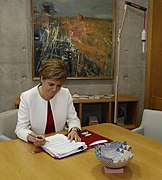First Minister of Scotland
| First Minister of Scotland | |
|---|---|
| Scottish Gaelic: Prìomh Mhinistear na h-Alba | |
 | |
 Flag of Scotland | |
since 8 May 2024 | |
| Office of the First Minister Scottish Government Scottish Cabinet Scottish Parliament | |
| Style | First Minister and Keeper of the Scottish Seal[1] (formal) First Minister (informal) The Right Honourable (UK and Commonwealth) His/Her Excellency[2] (international) |
| Status | Head of government |
| Member of | |
| Reports to | Scottish Parliament |
| Residence | Bute House |
| Seat | St Andrew's House |
| Nominator | Scottish Parliament |
| Appointer | The monarch |
| Term length | At His Majesty's pleasure (following nomination by the Scottish Parliament) |
| Inaugural holder | Donald Dewar |
| Formation | 17 May 1999 |
| Deputy | Deputy First Minister of Scotland |
| Salary | £165,678 per annum (2023)[a][4] (including £67,662 MSP salary) |
| Website | firstminister |
| This article is part of a series within the Politics of the United Kingdom on the |
| Politics of Scotland |
|---|
 |
The first minister of Scotland (Scottish Gaelic: prìomh mhinistear na h-Alba, [ˈpʰrʲiəv ˈvinɪʃtʲɛr nə ˈhal̪ˠapə], formally known as the First Minister and Keeper of the Scottish Seal,[5] is the head of government of Scotland and the leader of the Scottish Government, the executive branch of the devolved government of Scotland. The first minister also serves as the keeper of the Great Seal of Scotland whilst in office.
The first minister chairs the Scottish Cabinet and is primarily responsible for the formulation, development, and presentation of the Scottish Government's policies. Additional functions of the first minister include promoting and representing Scotland in an official capacity, at home and abroad.[6] The first minister is nominated by the Scottish Parliament by members of the Scottish Parliament (MSPs), and is formally appointed by the monarch. Members of the Scottish Cabinet, junior ministers of the Scottish Government, as well as the Scottish law officers, are appointed by the first minister. The first minister is directly accountable to the Scottish Parliament for their actions and the actions of the wider government and cabinet.
The office is currently held by John Swinney, the MSP for Perthshire North and the leader of the Scottish National Party (SNP). Swinney was elected first minister by the Scottish Parliament on 7 May 2024, and was sworn in on the following day.[7]
History
[edit]Following the referendum in 1997, in which the Scottish electorate gave their consent, the Scottish Parliament and Scottish Executive (later the Scottish Government) were established by the Parliament of the United Kingdom and the Labour government of the prime minister, Tony Blair.
Under the Acts of Union 1707, the former Parliament of Scotland merged with the English parliament, forming the Parliament of Great Britain. The re-establishment of a dedicated legislature and executive for Scotland was known as devolution and initiated a measure of home rule (self-governance) in its domestic affairs, such as health, education and justice.[8] The devolution movement came to a head in the 1970s, and resulted in a Royal Commission on the Constitution, leading to the Scotland Act 1978. This would have established an autonomous Scottish Executive with a leader termed 'First Secretary', a post for which Strathclyde political leader Geoff Shaw was widely expected to be chosen.[9][10] Shaw died prematurely and the failure of the referendum of 1979 led to the Act not being implemented.
Following the 1997 referendum and Scotland Act 1998, Scottish devolution led to the establishment of a post of first minister as head of the devolved Scottish Government.
Since 1999, the Secretary of State for Scotland of the British Government has had a much reduced role at the renamed Scotland Office as a result of the transfer of responsibilities to the Scottish Parliament and Scottish Government.[11]
Election and term
[edit]Nomination as First Minister
[edit]The first minister is nominated by the Scottish Parliament at the beginning of each term, by means of an exhaustive ballot among its members, and is then formally appointed by the monarch.[12]
Although any member of the Scottish Parliament can be nominated for first minister, the government must maintain the confidence of the Scottish Parliament in order to gain supply (access to exchequer funds) and remain in office. For this reason, every permanent first minister has been the leader of the largest party, or the leader of the senior partner in any majority coalition. There is no term of office for a first minister; they hold office "at His Majesty's pleasure". In practice, a first minister cannot remain in office against the will of the Scottish Parliament; indeed, the Scotland Act explicitly requires the first minister to either resign or seek a parliamentary dissolution (and with it, new elections) if his or her government "no longer enjoys the confidence of the Parliament." Whenever the office of first minister falls vacant, the sovereign is responsible for appointing the new incumbent upon nomination by the Scottish Parliament; the appointment is formalised at a meeting between the sovereign and the first minister designate.[12]
Given the additional member system used to elect its members, it is difficult for a single party to gain an overall majority of seats in the Scottish Parliament.[13] The SNP did gain an overall majority of seats in the 2011 election, and thus had enough numbers to vote in its leader, Alex Salmond, as first minister for a second term.
After the election of the Scottish Parliament, a first minister must be nominated within a period of 28 days.[12] Under the terms of the Scotland Act, if the Parliament fails to nominate a first minister, within this time frame, it will be dissolved and a fresh election held.[12] If an incumbent first minister is defeated in a general election, they do not immediately vacate office. The first minister only leaves office when the Scottish Parliament nominates a successor individual.[12]
Oath of office
[edit]After accepting office, the first minister takes the Official Oath, as set out in the Promissory Oaths Act 1868.[14] The oath is tendered by the Lord President of the Court of Session at a sitting of the Court in Parliament House in Edinburgh.[14] The oath is:
I, [name], do swear that I will well and truly serve His Majesty King Charles in the office of first minister of the Scottish Government, So help me God.
Term in office
[edit]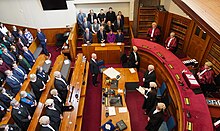
The period in office of a first minister is not linked to the term of members of the Scottish Parliament. The Scotland Act set out a four-year maximum term for each session of Parliament.[15] The Act specifies than an election to the Scottish Parliament will be held on the first Thursday in May, every four years, starting from 1999.[15] Parliament can be dissolved and an extraordinary general election held, before the expiration of the four-year term, but only if two-thirds (or more) of elected MSPs vote for such action in a resolution of the Scottish Parliament. If a simple majority of MSPs voted a no-confidence motion in the first minister or government, that would trigger a 28-day period for the nomination of a replacement; should that time period expire without the nomination of a new first minister, then an extraordinary election would have to be called.[16]
The first minister, once appointed, continues in office as the head of the Scottish Government until they resign, are dismissed or die in office. Resignation can be triggered by the passage of a Motion of No Confidence in the first minister or the Scottish Government or by rejecting a motion of confidence in the Scottish Parliament.[12] In those situations, the first minister must tender their resignation and the resignation of their government.[12] In such circumstances, the presiding officer would appoint an interim first minister, until the Scottish Parliament determined on a new nominee to be appointed by the monarch.[12]
During their tenure in office, the First Minister is supported by the Chief of Staff to the First Minister, who acts at the first minister's principal adviser on the first minister's strategic programme in government, inter-governmental relations, co-ordination of the team of special advisers to the first minister.[17]
Legislative powers
[edit]Scots Law and civil service
[edit]
As detailed in the Scotland Act 1998, the First Minister is responsible for recommending to the monarch a nominee for the position of Lord Advocate and Solicitor General for Scotland. The First Minister is also responsible for advocating whether a Lord Advocate or Solicitor General who is currently in post should be removed, subject to the approval of the Scottish Parliament.[18] Additionally, the First Minister has various functions and responsibilities regarding the appointments and removal of Scottish judges within the Scottish court system.[18]
The Permanent Secretary to the Scottish Government is nominated by the First Minister. The permanent secretary is the most senior civil servant in Scotland who serves to promote, implement, develop and communicating the Scottish Government's policy agenda. The First Minister is directly responsible for the management of the civil service in Scotland, as well as civil service staff within the Scottish Government.[18]
The First Minister has responsibility in respect of the exercise of operation and functions during vacancies which may arise in the offices of Lord President of the Court of Session and Lord Justice Clerk and the incapacity of the holders of those offices as outlined in the Senior Judiciary (Vacancies and Incapacity)(Scotland) Act 2006.[18] Additionally, the First Minister considers any action relating to recommendations made by the Standards Commission or Chief Investigating Officer in regards of Crown Appointments under Section 23 of the Ethical Standards in Public Life etc (Scotland) Act 2000.[18]
The First Minister is an official consultee regarding selections for membership of the Supreme Court.[18]
Security and intelligence
[edit]
The Office of the First Minister has responsibility for all functions relating to reports made by the Interception of Communications Commissioner and Intelligence Services Commissioner as detailed in both Sections 58 and 60 of the Regulation of Investigatory Powers Act 2000.[18] During times of national crisis, such as flooding, terror attacks or public health emergencies, the First Minister chairs the Scottish Government Resilience Room (SGoRR).[19] The function of the resilience room committee is to co-ordinate policy and response to major events in Scotland that affect the population and, with the help of specialist teams within the division assist department, develop detailed risk assessments which are used to inform policy across Scotland.[20]
There are currently different levels of resilience response in Scotland which is overseen by the First Minister and Scottish Government ministers:[21]
- Cabinet Sub-Committee: Scottish Government Resilience CSC
- The Scottish Resilience Partnership (SRP)
- Scottish Government Resilience (Ministerial): SGoR(M)
- Scottish Government Resilience (Officials): SGoR(O)
- Scottish Government Resilience Room (SGoRR)
The First Minister is directly responsible for each of the corresponding resilience levels in Scotland, and has the responsibility of the Scottish Government Liaison Offices who can be deployed in emergencies and national crisis to act as the principal point of contact for the First Minister, Scottish Government and other Scottish ministers.[21]
If a crisis or emergency is considered to affect the entirely of either the United Kingdom or the British Isles, such as the 2007 Glasgow Airport attack, the UK Government and Scottish Government (along with the governments of both Wales and Northern Ireland), will develop a co-ordinate response to a UK wide emergency or crisis.[21] The First Minister is directly responsible for co-ordinating this policy and would be called to attend the UK Government's emergency room, COBRA, for instances such as a significant terrorist attack, a serious outbreak of animal disease or emergencies affecting large numbers of British citizens overseas.[21]
Keeper of the Great Seal
[edit]The First Minister is the Keeper of the Great Seal of Scotland which is considered to be one of the highest privileges of the office. The First Minister has additional responsibility over how Wafer Scottish Seals are to be kept and how they are to be taken under section 38(4) & 38(5)(b) of the Scotland Act. The First Minister has the power to sign royal warrants on behalf of the monarch.[18]
As Keeper of the Great Seal, First Minister Humza Yousaf was the first First Minister to oversee the departure of the Stone of Scone, an ancient symbol of Scotland's nationhood, for Westminster Abbey for usage in the Coronation of Charles III and Camilla on 6 May.[22]
Privy Council
[edit]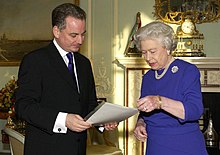
The First Minister is a member of the Privy Council and is appointed by the Monarch. There are a variety of matters in which the Prime Minister would offer advice to the monarch on the exercise of their functions and on which it would be appropriate for the Prime Minister to consult or to take advice from the First Minister. Such matters include the recommendations of Scottish candidates for honours and dignities, which are currently a reserved matter under the devolution settlement, and advice on the appointment of the Lords Lieutenants in Scotland, the Lord High Commissioner to the General Assembly of the Church of Scotland and members of the Royal Commission on Environmental Pollution and the Forestry Commission. There are also matters where a Minister of the Crown gives advice to the reigning monarch and the First Minister would need to be consulted by the Minister of the Crown, or would be required to give advice to that Minister of the Crown.[18]
The Scotland Act 1998 confers upon the First Minister various functions of advising the monarch directly. Such functions include seeking the monarch's approval regarding the appointment of Scottish Ministers as well as recommending to the monarch nominations for appointment as Scottish Law Officers. Section 95 of the Scotland Act highlights the arrangements for the First Minister to nominate for the appointment as Lord President of the Court of Session and Lord Justice Clerk. Additionally, the Scotland Act also grants the First Minister to recommend to the monarch the appointment of other judges.[18]
Executive powers
[edit]The First Minister is the head of the Scottish Government and is responsible for the overall development, implementation and presentation of the government's policies, as well as responsible promoting and representing Scotland at home and overseas.[23] The role and powers of the first minister are set out in sections 45 to 49 of the Scotland Act 1998.[12]
Cabinet appointments
[edit]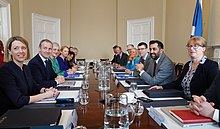
Following their appointment, the first minister may then nominate ministers to sit in the Scottish Cabinet and junior ministers to form the Scottish Government. They are then formally elected by the Scottish Parliament. Ministers hold office at His Majesty's Pleasure and may be removed from office, at any time, by the first minister. The first minister also has the power to appoint the law officers and chief legal officers of the Scottish Government – the lord advocate and the solicitor general but only with the support of the Scottish Parliament.
Accountability to parliament
[edit]The first minister is responsible to the Scottish Parliament for their actions and the actions of the overall Scottish Government. MSPs can scrutinise the activities of the first minister and their Cabinet by tabling written questions or by asking oral questions in the Scottish Parliament. Direct questioning of the first minister takes place at First Minister's Questions (FMQs) each Thursday at noon when Parliament is sitting. The 30-minute session enables MSPs to ask questions of the first minister, on any issue. The leaders of the largest opposition parties have an allocation of questions and are allowed to question the first minister each week. Opposition leaders normally ask an opening question to the first minister, relating to their meeting with the Scottish Cabinet, or when they next expect to meet the Prime Minister, and then follow this up by asking a supplementary question on an issue of their choosing.
In addition to direct questioning, the first minister is also able to deliver oral statements to the Scottish Parliament chamber, after which members are invited to question the first minister on the substance of the statement. For example, at the beginning of each parliamentary term, the first minister normally delivers a statement, setting out the legislative programme of the Government, or a statement of government priorities over the forthcoming term.[24]
Foreign relations
[edit]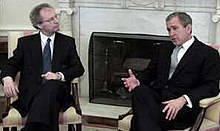
Whilst foreign policy remains a reserved matter,[25] the Scottish Government, and the First Minister, may promote the economy and Scottish interests on the world stage and encourage foreign businesses, international devolved, regional and central governments to invest in Scotland.[26] Whilst the first minister usually undertakes a number of international visits to promote Scotland, international relations, European and Commonwealth relations are also included within the portfolios of the Cabinet Secretary for Culture, Tourism and External Affairs (responsible for international development)[27] and the Minister for International Development and Europe (responsible for European Union relations and international relations).[28] Overall, accountability for intergovernmental relations is the responsibility of the First Minister.[29]
The First Minister is a member of the Heads of Government Council ("The Council") (previously the Joint Ministerial Committee) and the Council of Nations and Regions. Other cabinet secretaries and junior ministers within the Scottish Government participate in tier two (the Inter-ministerial Standing Committee) and tier 3 (the Inter-ministerial Group) of The Council which may include areas including education, finance and economy, investment and trade and rural affairs.[29]
The First Minister represents Scotland at the annual British-Irish Council summits.[30]
Deputy and 'Acting' First Minister
[edit]
Associated with the office of first minister, there is also the post of deputy first minister. Unlike the office of first minister, the post of deputy is not recognised in statute and confers no extra status on the holder. Like the first minister, the deputy first minister is an elected member of the Scottish Parliament and a member of the Scottish Government. From 1999 to 2007, when Scotland was governed by a Labour–Liberal Democrat coalition, the leader of the Liberal Democrats – the junior government party – was given the role of deputy first minister; a title which they held in conjunction with another ministerial portfolio. For example, Nicol Stephen, deputy first minister from 2005 to 2007, simultaneously held the post of Minister for Enterprise and Lifelong Learning.
On two occasions since 1999, the deputy first minister has assumed the role of 'acting' first minister, inheriting the powers of the first minister in their absence or incapacitation. From 11 October 2000 to 26 October 2000, following the death in office of the then First Minister Donald Dewar, his deputy Jim Wallace became acting first minister, until the Labour party appointed a new leader, and consequently first minister.[31] Wallace also became Acting First Minister between 8 November 2001 and 22 November 2001, following the resignation of Henry McLeish.[31]
An officer with such a title need not always exist; rather, the existence of the post is dependent on the form of Cabinet organisation preferred by the first minister and their party. The deputy first minister does not automatically succeed if a vacancy in the premiership is suddenly created. It may be necessary for the deputy to stand in for the first minister on occasion, for example by taking the floor at First Minister's Questions.
Precedence and privileges
[edit]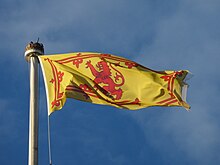
The first minister is, by virtue of section 45(7) of the Scotland Act 1998, ex officio the keeper of the Great Seal of Scotland and their place in the order of precedence in Scotland is determined by the holding of that office.[32][33] The scale of precedence in Scotland was amended by royal warrant on 30 June 1999 to take account of devolution and the establishment of the post of first minister.[33] The amended scale reflected the transfer of the office of keeper of the Great Seal from the secretary of state for Scotland to the first minister and also created a rank for the presiding officer of the Scottish Parliament.[33] Throughout Scotland, the first minister outranks all others except the royal family, lord lieutenants, the sheriff principal, the Lord Chancellor, the moderator of the General Assembly of the Church of Scotland, the prime minister of the United Kingdom, Commonwealth prime ministers (whilst in the United Kingdom), the speaker of the House of Commons and the Lord Speaker.[33] As keeper of the Great Seal, the first minister is entitled to fly the Royal Banner of Scotland.[34]
As of April 2015, the first minister is entitled to draw a total salary of £144,687, which is composed of a basic MSP salary of £59,089 plus an additional salary of £85,598 for the role as first minister.[35] This can be compared to the UK Prime Minister who is entitled to draw a total salary of £142,500, composed of a basic MP salary of £67,060 and an additional office holder's salary of £75,440 (the total entitlement for the prime minister had peaked at £198,661 in April 2011 but this was then dropped by around 25%).[36] The first minister is the highest paid member of the Scottish Government. Sturgeon said she would claim £135,605, £9,082 less than her entitlement, as part of a voluntary pay freeze pegging her salary to 2008/09 levels.[37]
The first minister traditionally resides at Bute House which is located at number 6 Charlotte Square in the New Town of Edinburgh.[38] The house became the property of the National Trust for Scotland in 1966, after the death of the previous owner John Crichton-Stuart, 4th Marquess of Bute and remains in the ownership of the National Trust for Scotland.[38] Prior to devolution, Bute House was the official residence of the Secretary of State for Scotland.[38] Weekly meetings of the Scottish Cabinet take place in the Cabinet room of the house.[38] Bute House is also where the first minister holds press conferences, hosts visiting dignitaries and employs and dismisses government Ministers. The Office of the First Minister is located at St Andrews House in Edinburgh.[39]
Appointments to the Privy Council of the United Kingdom are made by the monarch, although in practice they are made only on the advice of the UK government. To date all first ministers have been appointed members of the Privy Council, and therefore entitled to use the style 'Right Honourable'.
- Privileges of office of First Minister
-
Official Residence, Bute House at 6 Charlotte Square in Edinburgh
-
The First Minister has an office at St Andrew's House
-
One of the vehicles used by the Office of the First Minister, the Tesla Model 3[40]
-
The First Minister, and other ministers, also use the Kia Optima[40]
-
The First Minister has an office within the Scottish Parliament building
List of nominating elections
[edit]| Party key | Scottish Conservatives | |
|---|---|---|
| Scottish Labour | ||
| Scottish Liberal Democrats | ||
| Scottish National Party | ||
| Scottish Greens | ||
| Scottish Socialist Party | ||
| Independent |
| Parliamentary term | Date | Candidates | Votes received |
|---|---|---|---|
| 1st Parliament | 13 May 1999[41] | Donald Dewar | 71 |
| Alex Salmond | 35 | ||
| David McLetchie | 17 | ||
| Dennis Canavan | 3 | ||
| 26 October 2000[42] | Henry McLeish | 68 | |
| John Swinney | 33 | ||
| David McLetchie | 19 | ||
| Dennis Canavan | 3 | ||
| 22 November 2001[43] | Jack McConnell | 70 | |
| John Swinney | 34 | ||
| David McLetchie | 19 | ||
| Dennis Canavan | 3 | ||
| 2nd Parliament | 15 May 2003[44] | Jack McConnell | 67 |
| John Swinney | 26 | ||
| David McLetchie | 18 | ||
| Robin Harper | 6 | ||
| Tommy Sheridan | 6 | ||
| Dennis Canavan | 2 | ||
| Margo MacDonald | 2 | ||
| 3rd Parliament | 16 May 2007[45] | Alex Salmond | 49 |
| Jack McConnell | 46 | ||
| 4th Parliament | 18 May 2011[46] | Alex Salmond | 68 |
| 19 November 2014[47] | Nicola Sturgeon | 66 | |
| Ruth Davidson | 15 | ||
| 5th Parliament | 17 May 2016[48] | Nicola Sturgeon | 63 |
| Willie Rennie | 5 | ||
| 6th Parliament | 18 May 2021[49] | Nicola Sturgeon | 64 |
| Douglas Ross | 31 | ||
| Willie Rennie | 4 | ||
| 28 March 2023[50] | Humza Yousaf | 71 | |
| Douglas Ross | 31 | ||
| Anas Sarwar | 22 | ||
| Alex Cole-Hamilton | 4 | ||
| 7 May 2024 | John Swinney | 64 | |
| Douglas Ross | 31 | ||
| Anas Sarwar | 22 | ||
| Alex Cole-Hamilton | 4 |
Timeline of Scottish first ministers
[edit]
See also
[edit]Notes
[edit]- ^ The previous First Minister, Nicola Sturgeon, froze her salary at £140,496 (2008–09 levels) when she took office and donated the additional pay back to the Scottish government.[3]
References
[edit]- ^ "The Keeper". insideros.blog. Retrieved 27 April 2024.
- ^ "Nicola Sturgeon named as global advocate for UN gender equality campaign". BelfastTelegraph. 6 February 2019. Retrieved 9 January 2020.
UN under-secretary-general Ms Mlambo-Ngcuka said: "It is my honour to announce today her excellency Ms Nicola Sturgeon, First Minister of Scotland, as an inaugural HeForShe global advocate for gender equality.
- ^ "Five things about Scottish politicians' tax returns". BBC News Online. 7 February 2023.
- ^ "MSP salaries". parliament.scot. The Scottish Parliament. 5 April 2023.
- ^ "The Keeper - The Great Seal of Scotland". insideros.blog. Retrieved 27 April 2024.
- ^ "About the Scottish Government > Who runs government > First Minister". Scottish Government. Retrieved 9 January 2019.
- ^ "John Swinney officially sworn in as Scotland's seventh First Minister". STV News. 8 May 2024.
- ^ "History – The Path to Devolution". Scottish Parliament. Archived from the original on 14 September 2007. Retrieved 6 August 2007.
- ^ Ferguson, Ron (27 April 1998). "Through an open door". The Herald. Glasgow: Herald & Times Group. Retrieved 27 February 2021.
- ^ Ascherson, Neal (17 July 1993). "A cry of 'Gerrymander' as Strathclyde is axed". The Independent. London. Retrieved 27 February 2021.
- ^ "Devolution Guidance Note 3 – The role of the Secretary of State for Scotland" (PDF). Department for Constitutional Affairs (DCA). October 2006. Archived from the original (PDF) on 26 September 2007. Retrieved 6 August 2007.
- ^ a b c d e f g h i "Section 45 – Scotland Act 1998". Office of Public Sector Information. Retrieved 30 July 2007.
- ^ "Proportional Representation – What is Proportional Representation?". Politics UK. Archived from the original on 11 February 2007. Retrieved 7 August 2007.
- ^ a b "First Minister takes oath". Scottish Government. 17 May 2007. Archived from the original on 16 November 2020. Retrieved 7 August 2007.
- ^ a b "Scotland Act 1998 – Ordinary General Elections". Office of Public Sector Information (OPSI). Retrieved 7 August 2007.
- ^ "Scotland Act 1998 – Extraordinary General Elections". Office of Public Sector Information (OPSI). Retrieved 7 August 2007.
- ^ "Special advisers". www.gov.scot. 31 May 2024. Retrieved 2 June 2024.
- ^ a b c d e f g h i j "HC 842 The role and powers of the Prime Minister". Parliament.uk. 8 July 2011. Retrieved 8 September 2023.
- ^ "Who we are at Ready Scotland".
- ^ "Who we are at Ready Scotland". Safer Scotland. 8 September 2023. Retrieved 8 September 2023.
- ^ a b c d "PRINCIPLES – APPROACH – GOOD PRACTICE PHILOSOPHY, PRINCIPLES, STRUCTURE AND REGULATORY DUTIES". Safer Scotland. 8 September 2023. Retrieved 8 September 2023.
- ^ "Yousaf: I'll be making sure Stone of Destiny comes back to Scotland". 27 April 2023.
- ^ "First Minister".
- ^ "About: Performance: Programme for Government". Scottish Government. Retrieved 8 April 2015.
- ^ "Devolved and Reserved Matters – Visit & Learn". Scottish Parliament. 14 February 2017. Archived from the original on 22 July 2017. Retrieved 1 August 2018.
- ^ "International". gov.scot. Retrieved 1 August 2018.
- ^ "Cabinet Secretary for Culture, Tourism and External Affairs". gov.scot. Archived from the original on 1 August 2018. Retrieved 1 August 2018.
- ^ "Minister for Europe, Migration and International Development". gov.scot. Retrieved 1 August 2018.
- ^ a b "The Review of Intergovernmental Relations" (PDF). Government of the United Kingdom. Retrieved 30 May 2023.
- ^ "First Minister leads Scottish delegation to British-Irish Council". Scottish Government. Retrieved 9 September 2023.
- ^ a b "World Statesmen – United Kingdom, Scotland". World Statesmen. Retrieved 4 August 2007. [deprecated source?]
- ^ Scotland Act 1998, section 45(7)
- ^ a b c d "The Scale of General Precedence in Scotland". Burkes Peerage. Archived from the original on 24 December 2010. Retrieved 4 August 2007.
- ^ "The Royal Banner of the Royal Arms of Scotland". The Royal Household. Retrieved 28 April 2023.
- ^ "BUSINESS BULLETIN No. 48/2015" (PDF). Scottish Parliament. 17 March 2015. Retrieved 17 March 2015.
- ^ "Members' pay and expenses – current rates from 1 April 2013 RESEARCH PAPER 13/33". House of Commons. 31 May 2013. Retrieved 17 March 2015.
- ^ "The UK's highest paid politicians: Who gets what?". Newsbeat. BBC. 19 March 2015.
- ^ a b c d "Bute House Guidebook" (PDF). Scottish Government. 3 January 2003. Retrieved 29 October 2014.
- ^ "Bute House". Office of the First Minister (Scottish Government). Retrieved 8 April 2015.
- ^ a b "Elon Musk's Tesla is Scottish Government new car of choice". 18 March 2022.
- ^ "Dewar wins top job". BBC. 13 May 1999. Retrieved 28 January 2016.
- ^ "McLeish wins first minister title". BBC. 26 October 2000. Retrieved 28 January 2016.
- ^ "22 November 2001: McConnell elected First Minister". BBC. 31 October 2009. Retrieved 28 January 2016.
- ^ "Second term for McConnell". BBC News. 15 May 2003. Retrieved 28 January 2016.
- ^ "Salmond elected as first minister". BBC. 16 May 2007. Retrieved 19 March 2016.
- ^ "SNP leader Alex Salmond re-elected as first minister". BBC News. 18 May 2011. Retrieved 16 February 2016.
- ^ "Nicola Sturgeon is elected first minister of Scotland". BBC News. Retrieved 28 January 2016.
- ^ "Nicola Sturgeon wins Scottish first minister vote". BBC News. 17 May 2016. Retrieved 17 May 2016.
- ^ "Nicola Sturgeon re-elected as Scotland's first minister". BBC News. 18 May 2021. Retrieved 18 May 2021.
- ^ "Humza Yousaf confirmed as Scotland's new first minister". BBC News. 28 March 2023. Retrieved 28 March 2023.

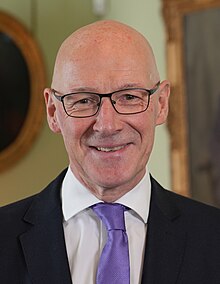
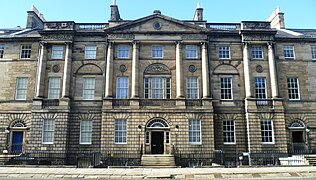
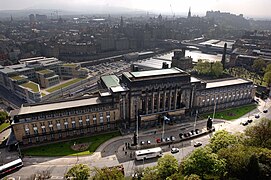
![One of the vehicles used by the Office of the First Minister, the Tesla Model 3[40]](http://up.wiki.x.io/wikipedia/commons/thumb/e/e5/Tesla_Model_3_Monaco_IMG_1212.jpg/270px-Tesla_Model_3_Monaco_IMG_1212.jpg)
![The First Minister, and other ministers, also use the Kia Optima[40]](http://up.wiki.x.io/wikipedia/commons/thumb/e/e1/20100731_kia_k5_01.jpg/375px-20100731_kia_k5_01.jpg)
